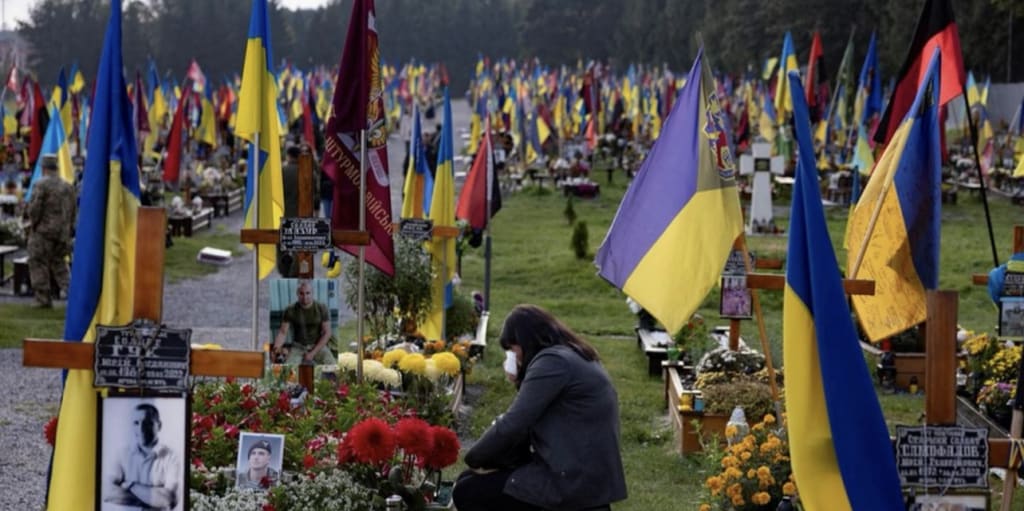War-weary Ukrainians endure as Russia’s invasion drags on
1

Nearly two years since the Russian invasion of Ukraine, Fergal Keane returns to the Lviv station where in February and March 2022 he witnessed the biggest refugee crisis in Europe since World War Two.
In the stories of two individuals he examines how the war - now dragging into its third year - has affected the people of Ukraine.
We heard the screams from far away. They came floating across the rows of the dead, over other graves still waiting to be filled, and over the rows of flags to commemorate the fallen, that flapped in the icy wind.
The military cemetery of the Field of Mars in Lviv is usually a place of whispered prayers and stifled sobs.
But on this winter morning the sound was a full-throated rage.
He was about 100 yards away, a middle-aged man in military camouflage, walking between the lines of graves. He stopped and raised his hands to the sky and shouted out: "Death to the enemy."
He walked on and after a few steps began to scream again. No words. Just an agonised howl that gradually faded as he moved away.
Nearby, a mother and daughter were settling flowers around the grave of a young man, a son, a brother. They had heard the commotion but continued with their work as if, two years and thousands of deaths into the war, it was all part of the normal order of things.
There are war funerals most days in Lviv. The coffins are brought first to Saints Peter and Paul Garrison Church where I witnessed the first funerals of the Russian invasion back in February 2022. Then, the war felt dramatically like a fight for national survival.
The city of Lviv was the setting for the greatest refugee crisis in Europe since World War Two.
More than ten million Ukrainians had been uprooted from their homes and Lviv station teemed with refugees fleeing west. Stories of atrocities from places like Bucha and Mariupol arrived with every refugee train.
The drama captured the attention of the world. People fought to get on trains. The elderly and the sick were carried in wheelchairs up the crowded steps to the platforms.
There was the constant noise of children crying, voices on the station tannoy, the whistles of trains arriving and departing, and always the air raid sirens to remind people that death could come at any time.
To return is to find a station that has accustomed itself to war. On platform five the refugee crowds are long gone.
So too the army of volunteer medics and stewards, cooks and musicians, whose kindness helped ease the terror felt by so many.
Now there are young men and women waiting in the cold and shadows for trains to take them east to fight. And there are families returning from abroad for brief visits to loved ones still living in Ukraine.
Two years on, the war has settled on Lviv station, a stubborn season that will not move. There is weariness. And everywhere, stories of what's been lost.
Take the story of Natasha Ambarova. She was a doctor who ran an emergency clinic at the station.
We met at the height of the refugee crisis, when she was directing a team of doctors, nurses and volunteers, constantly on the move down the long, crowded corridors to wherever help was needed.
Through all of this she was dealing with a family crisis: Natasha is of Russian origin and her siblings in Moscow supported Putin's war. Natasha has lost all contact with her Russian family.
"These people are lost for me. They will never say no and will remain silent like slaves."
Natasha is teaching medicine at Lviv University, aware that her students might be drafted to fight. Several staff from the university have been killed.
Her own feelings towards Russia have hardened. She describes the air raids on the city, and how her children were woken by a door being blown off its hinges by an explosion.
Now this doctor, this mother of a 11-year-old son and two-year-old daughter, wants to fight. The healer of bodies would like to be a sniper.
"I love shooting from different weapons. I would be a good sniper," she says.
When I ask how someone whose mission it is to heal felt about being prepared to kill, she replies: "It's my war… I will kill anyone so my children will be safe. This is a matter of survival. I am fighting for my land."
The war is impacting the psyche of Ukrainians in many different ways. After so much suffering, trauma is everywhere and expresses itself in different ways.
But it has not erased the spirit of kindness that was so evident two years ago.
In a carriage heading towards Kyiv, I meet a short, stocky man with an engaging smile.
Volodymyr Moisei is one-armed, the consequence of a car accident several years ago, and so his military role is that of a chaplain. But he is also a bringer of gifts, delivering presents and treats to children living in front-line areas.






Comments
There are no comments for this story
Be the first to respond and start the conversation.